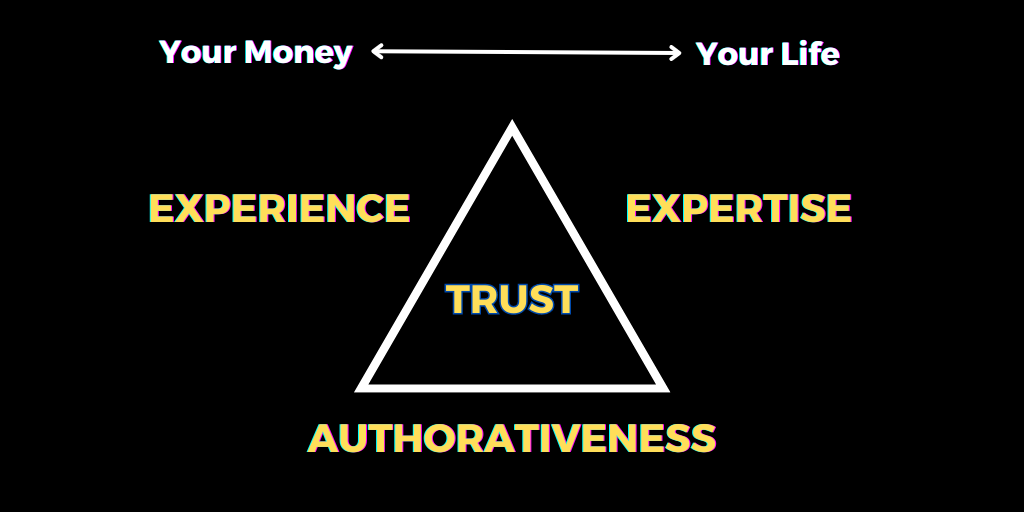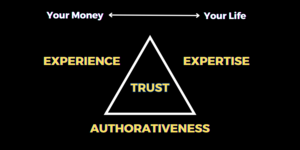Most attorneys didn’t go to law school to become marketing experts. Yet here you are, trying to decode algorithm updates while managing a practice, wondering if your website is working for you or against you.
The truth is, effective legal marketing isn’t about mastering every digital trend. It’s about implementing the right systems—tools that build genuine credibility while giving you back precious hours to focus on what you do best: serving clients.
When your digital presence aligns with Google’s EEAT (Experience, Expertise, Authoritativeness, Trust) and YMYL (Your Money, Your Life) standards, something powerful happens: search engines notice, and more importantly, potential clients feel confident choosing your firm.
This series is based on a long-form post entitled: “How Google Really Evaluates Law Firm Websites in 2025 (and 4 Changes You Must Make)”. You can check it out via this link.
Problem: A Static Website That's Losing Authority
Why It Matters
A website frozen in time signals to both Google and visitors that your firm might be equally static. When prospective clients land on outdated content, they question whether you’re actively practicing—or whether you’ll be responsive to their needs.
Tool or Technique
Use AI-Powered Content Assistants (Like Jasper, Notion AI, or ChatGPT Pro)
These platforms excel at transforming your existing expertise into fresh content. Rather than starting from scratch, use AI to help structure the insights you already share with clients daily.
AI won’t replace you—it’ll amplify your best thinking.
Sataya Nadella Tweet
🧠 Pro Tip:
Record yourself answering three common client questions during lunch breaks. Use AI to transform these recordings into monthly articles, each paired with a practical resource like “5 Questions to Ask Before Updating Your Will.”
For help in improving your prompt skills, check out this post on Structured Directive Enforcement (SDE) and Structured Layout Engineering (SLE). Get the most value out of your tools and the time you spend on them!

Problem: You Don't Know What's Working on Your Website
Why It Matters
Flying blind with your website is like practicing law without discovery. You’re making critical decisions about your firm’s growth without knowing how visitors actually interact with your content or where they abandon the process.
Great tools don’t just automate—they illuminate.
Sirus Digital Tweet
Tool or Technique
Install Microsoft Clarity or Hotjar (Free Visual Analytics)
These tools reveal the story your website visitors can’t tell you directly—where they hesitate, what captures their attention, and at what point they decide to leave or take action.

🧠 Pro Tip:
Watch five session replays monthly to identify patterns. If visitors consistently scroll past your attorney bio but linger on case results, consider moving testimonials higher and adding more specific expertise markers to your introduction.
For more specifics on how to improve your Attorney Bios, check out this post (How We Fixed An Attorney Bio Page By Adding One Line Of Human StoryTelling).
Problem: Client Trust Breaks at the Contact Stage
Why It Matters
Your website built initial confidence, but complex forms or unclear next steps can derail a potential client relationship before it begins. In sensitive legal matters, people need to feel the path forward is both simple and secure.
Tool or Technique
Integrate Calendly or Lawmatics to Streamline Contact
Transform the traditional contact form barrier into an invitation. Let potential clients see your availability and choose a time that works for them, removing the back-and-forth guesswork.
Trust grows fastest when access feels easy.
Digital service maxim Tweet
💡 Before/After:
- Before: A generic form asking “How can we help?” with no indication of response time or next steps.
- After: “Schedule a confidential 15-minute consultation” with immediate calendar access and automated confirmation detailing what to expect.
Problem: Your Reviews Are Outdated or Missing Altogether
Why It Matters
In legal services, reputation isn’t just marketing—it’s risk management. Current reviews demonstrate ongoing client satisfaction and active practice, both crucial signals for Google’s algorithm and client confidence.
Tool or Technique
Use Birdeye, GatherUp, or a Google Reviews Link to Automate Review Requests
Create a systematic approach to gathering feedback at natural conclusion points—after successful case resolution or positive consultation feedback.
🧠 Pro Tip:
Feature recent reviews prominently on service pages with specific phrases like “thorough,” “patient,” or “explained everything clearly”—language that resonates with people seeking legal guidance during stressful times.
Problem: You Don't Have a Process for Updating Site Security or Legal Info
Why It Matters
Legal websites handle sensitive inquiries and personal information. Outdated security measures or missing privacy policies don’t just harm search rankings—they can erode client trust before the relationship even begins.
Tool or Technique
Use Website Compliance Scanners (like Cookiebot or Termly)
Automate the technical compliance aspects so you can focus on content and client service, knowing your site meets current security and privacy standards.
💡 Before/After:
- Before: Static disclaimers from 2019 and no visible security indicators.
- After: Current privacy policies, SSL certificates prominently displayed, and automated compliance updates that maintain client confidence.

Recap & Roadmap: What to Do Next
Building a trustworthy digital presence doesn’t require a complete overhaul. Here’s how to approach it systematically:
Modern marketing isn’t louder. It’s smarter.
Lucas Mariscal Tweet
- 30 Days: Implement visitor tracking tools, streamline your contact process, and review all existing content for accuracy and relevance.
- 60 Days: Establish a monthly content routine using AI assistance. Update professional profiles and ensure all contact methods work seamlessly.
- 90 Days: Deploy automated review collection, integrate scheduling tools, and begin measuring which changes actually increase client inquiries.
This is the fourth of a four-part series from Sirus Digital designed to help legacy-minded law firms build a trusted online presence by aligning with Google’s EEAT (Experience, Expertise, Authoritativeness, and Trustworthiness) and YMYL (Your Money, Your Life) standards.
- The Digital Credibility Framework Every Law Firm Must Understand in 2025
Understand the fundamentals of EEAT and YMYL and why they matter more than ever for legal professionals. - Credibility Is the New Currency: Building a Legal Website That Converts and Ranks
Explore the website signals that influence both search engines and prospective clients—and how to get them right. - What You Must Change on Your Website Right Now
A practical guide to the most common law firm website mistakes—and how to correct them fast. - Smarter Law Firm Marketing: Tools That Build Trust and Free Your Time
Discover tools and techniques that elevate your digital presence while giving you back time for client work.
Sirus Digital Can Help You Make It Happen
These strategies work—but implementing them while managing a busy practice is another challenge entirely.
At Sirus Digital, we understand the unique demands facing estate planning, elder law, and financial-focused attorneys. We’ll help you identify which tools will have the greatest impact on your specific practice, implement systems that build genuine trust, and ensure your online presence reflects the expertise and care you bring to every client relationship.
Ready to turn your website into a trusted partner for your practice? Let’s start the conversation.



